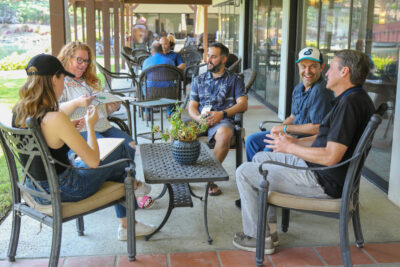
How Lead Pastors Can Unite a Politically Divided Church
Your ability to unite a politically divided church will send a powerful witness to the world. Here are six tips to help you unify your divided church.
After one of the most raucous presidential campaigns in a generation, America seems more divided politically than it has been in years. You can’t escape it. Turn on the TV, and you hear talking heads yelling at each other. Go to the barber shop, and it leads the conversation.
And you can’t get away from it at church either.
For pastors, that presents a unique challenge. Jesus tied the church’s unity to its ability to fulfill its evangelistic mission (John 17:20–21). When we fight, we send a distressing signal to the rest of the world about the Christian faith.
Yet in times of deep divisions, as we’re in now, the kind of otherworldly unity that Jesus urges in John 17 seems elusive.
But it’s not impossible.
From the early days of the church, we’ve found unity in spite of our differences. For example, the first disciples had vast political differences (from Simon the Zealot to Matthew the Roman tax collector).
Your church can do likewise, but it won’t be easy. Lead pastors who want to unify their churches despite political differences must lead the way. These five actions can go a long way in helping you bridge this important divide.
1. Preach boldly
You don’t unite a politically divided church by witholding biblical truth from the issues of our day. Our churches have a responsibility to help people put the Bible into practice in all aspects of their lives—that includes the social, moral, and ethical issues that dominate our politics. To do otherwise is nothing less than spiritual malpractice. Teach what the Bible says about the topics that matter. Don’t sugarcoat it. Don’t mince words. Call it like the Bible sees it.
Seeking unity doesn’t mean silencing your prophetic voice.
But bold preaching doesn’t give us a license for uncaring and unthoughtful proclamation. Paul’s admonition in Ephesians 4:15 to “speak the truth in love” is as true in the pulpit as it is in the marketplace. Give people the benefit of the doubt. Don’t question their motives. Talk about others as you’d want them to talk about you.
And remember the Bible bows to no ideology. Faithful preaching of the whole counsel of God’s Word will never sit comfortably with a particular political persuasion. No political party or ideology completely lines up with the Bible. If your bold preaching only calls out a single political party or even a single political ideology, you’ve become a political tool, not a prophet.
Ann Lamont once said, “You can safely assume you’ve created God in your own image when it turns out he hates all the same people you do.”
When in doubt, preach the gospel. The gospel has always been the unifying message of the church.
2. Clarify priorities
The Bible makes it clear that we serve one King. Psalm 119 says, “The Lord reigns, let the earth rejoice; let the many coastlands be glad!” You’ll find no mention of any political institution in that majestic Psalm. God’s reign alone is supreme. “We elect American presidents for a brief time,” writes Charles Drew, commenting on that verse in his book, Broken Body: Can Democrats and Republicans Sit in the Same Pew? “Their ‘reign’ is neither permanent, nor absolute, nor flawless, nor worldwide, whereas God’s is all four.”
To unite our churches, we must consistently teach the supremacy of God and His Kingdom in the life of the church. Yes, we have a national identity—but that identity never gets to call the shots in our lives over our Christian faith. We report to a higher authority. Rick Stearns writes:
“That blue passport—the envy of many in the world—is only paper next to our true pledge of allegiance to Christ, when we accept Him as Lord of our lives and pray that His kingdom come and His will be done on earth as it is in heaven.”
3. Avoid endorsing candidates
For the past few years, there have been increased calls for pastors to ignore the possible repercussions on their church’s tax-free status and endorse specific political candidates. Whatever you think about tying tax benefits to a church’s political speech, identifying and promoting specific candidates could contribute to fragmenting your church. Doing so will increase the perception that your church is a mouthpiece for a specific political cause or party. Polls shouldn’t determine pastoral leadership decisions, but nearly two-thirds of Americans don’t believe churches should endorse specific candidates.
Most churches aren’t doing this (Pew says only 14 percent of churchgoers have heard their pastors specify candidates from the pulpit). Let’s hope it stays like that.
4. Demonstrate relationships across party line
Relationships across party lines have become a thing of the past in recent years. The Washington Post recently hypothesized that soon interracial marriages will outnumber “bipartisan” marriages, as most people choose to marry people who agree with their political persuasion. Nearly two-thirds of conservatives and half of liberals say most of their friends share their political beliefs. Leaders who want to see their congregations unite despite their political differences must model the behavior they’re looking for. First, that means you need to have friends that cross the political aisle. Then you need to openly talk about those relationships, both in the pulpit and out of it. If your congregation doesn’t see your willingness to live in unity, why should they believe it’s important? Let your congregants see that you love and respect people with whom you differ.
5. Pursue ethnic diversity
Political and ethnic diversity tend to correlate. Unfortunately, most of our churches identify with a particular ethnic group (86 percent, according to one LifeWay Research study). Pursuing diversity isn’t easy. There’s a reason why 11 AM on Sunday continues to be the most segregated time of the week. Crossing racial lines at church sometimes mean making sacrifices on worship style and preaching style. We tend to gather around people who are like us.
But that’s no excuse. The Bible reminds us that diversity is in the church’s future. One day, representatives from every people on the planet will worship Jesus together (Revelation 7:9). Until that day, we have to be intentional about reaching out to those from a variety of backgrounds and including them in leadership opportunities.
6. Avoid caricatures
We use caricatures when we describe entire groups of people by their worst characteristics. Most caricatures we use to describe political ideologies fall apart when we look closely at them. All conservatives aren’t completely heartless. All liberals aren’t immoral. Every person you meet, regardless of political affiliation, is created by God and worthy of our love. The church should be the one place where people can feel like they’re treated as unique individuals and not lumped into a group that doesn’t fully describe them.
Unite or Die
In the years preceding the American Revolution, the colonists had little chance to defeat their British oppressors. The British were too big, too powerful, and had too much money to fall to a few small ragtag colonies in the New World.
But if those colonies united, anything was possible.
It was then that an old political cartoon that was used to gain the support of the colonies for the French and Indian War a decade earlier began to appear with altered wording: “Unite or die.”
And unite they did. Together those colonists defeated the greatest empire in the world at the time.
Jesus left your church a great challenge. One you are way too small for. Make disciples of all nations. If you’re divided, your church doesn’t stand a chance.
Unite and anything is possible.
What will you do?





